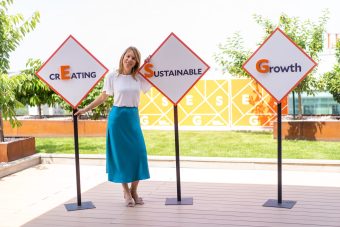
Delta Holding is successfully implementing its ESG strategy, which contributes to environmental protection and the improvement of the quality of life in the community. Tijana Koprivica, the company’s Sustainable Business Manager, spoke about its ESG goals and the projects and activities through which they are achieved.
Q. How does Delta Holding apply ESG criteria in its business operations, and which goals and strategies have you set?
A. We have formed an ESG team, made up of colleagues from all our subsidiaries, which has been tasked with creating strategic plans and analyzing and implementing innovative solutions in the fields of environmental, social, and governance. A strategy for sustainable development is part and parcel of the business strategy of all the subsidiaries of Delta Holding. Through defined environmental, social and plans for the improvement of business management, the company has set ambitious but realistic goals of having a positive effect on nature and society, as well as on the improvement of the economic environment on the markets where it conducts business.
Q. Which projects are most important and of most interest to the public, as well as the company, when it comes to environmental protection?
A. Through our environmental protection strategy, we are planning to reduce the consumption of energy from fossil fuels by 60 per cent by 2030. We have been investing in renewable energy sources since 2021 in order to achieve that goal. We currently have solar power plants at 15 locations, with a total capacity of around 5 MWh. We are planning to install solar panels at another eight locations this year. Apart from solar energy, we also use biomass in our business operations. In our factories, Seme Sombor and Dunavka, we use corn cobs, sunflower seed shells and soybean straw as energy sources. By switching to renewable energy sources, we’ll also reduce emissions of harmful gases. We are planning to reduce the amounts of generated waste and disposed waste and packaging, and to fully utilize waste as raw material for obtaining new products. One of Delta Holding’s members is also Delta-Pak, which provides services as an operator for managing packaging waste and consultancy in the fields of environmentalism, chemicals, and transportation of dangerous goods. It provides this service not only to Delta Holding members but also to external clients.
IN FOCUS:
- GREEN TRANSFORMATION OF THE REPUBLIC OF CROATIA
- EU SUPPORT FOR GREEN TRANSITION PROJECTS IN SERBIA
- WALK, RECYCLE, EARN TOKENS
Q. Do you apply sustainability standards in the construction of new facilities as well?
A. Our office building, Delta House, has the LEED Gold certification, and it was constructed using recycled materials such as UNIDOM plastic balls. Its façade is made of state-of-the-art materials, and it has been fitted with a cutting-edge ventilation system with optimal energy consumption and ionizers, which means the air quality is excellent. Two small solar power plants have been installed on the roof, along with a tank for rainwater, which is used as technical water. Sava Center is in the process of obtaining BREAM certification, and it’s also the first building in Serbia to be assessed in terms of compliance with EU Taxonomy criteria. The building’s energy efficiency was greatly improved during its renovation. The glass façade of Sava Center, which used to be made of single-pane glass, has been completely replaced with energy-efficient triple-pane glass, and we’ve also installed cutting-edge heating and cooling systems. 912 solar panels have been installed along the entire roof.
Q. Is investing in sustainable development a huge cost for companies, and does it have any benefits?
A. Companies that don’t adhere to sustainability principles cannot survive on the market. Hence, we don’t view investments in sustainable business as an expense; instead, we view them as investments. Companies whose business operations are not in line with sustainability principles are in danger of losing quality staff, long term business partners, buyers, and investors, and they’re also likely to encounter higher operating expenses as a result of energy inefficiency, additional fees for the pollution of the environment, emissions of harmful gases, etc. Specifically, in addition to contributing to the reduction of emissions and the consumption of energy obtained from conventional sources, investing in renewable energy sources is also going to help reduce our dependence on energy suppliers and our costs for energy sources, and it will also ensure financing from the so-called green sources.
Delta Holding
Read the whole interview in the new issue of the Energy portal Magazine NATURE CONSERVATION.

